
The Legion of Merit (LOM) is a military award of the United States Armed Forces that is given for exceptionally meritorious conduct in the performance of outstanding services and achievements. The decoration is issued to members of the eight uniformed services of the United States as well as to military and political figures of foreign governments.
The Presidential Medal of Freedom is an award bestowed by the president of the United States to recognize people who have made "an especially meritorious contribution to the security or national interests of the United States, world peace, cultural or other significant public or private endeavors." The Presidential Medal of Freedom and the Congressional Gold Medal are the highest civilian awards of the United States. The award is not limited to U.S. citizens and, while it is a civilian award, it can also be awarded to military personnel and worn on the uniform. It was established in 1963 by President John F. Kennedy, superseding the Medal of Freedom that was established by President Harry S. Truman in 1945 to honor civilian service during World War II.
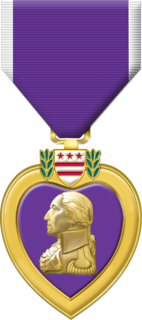
The Purple Heart (PH) is a United States military decoration awarded in the name of the President to those wounded or killed while serving, on or after 5 April 1917, with the U.S. military. With its forerunner, the Badge of Military Merit, which took the form of a heart made of purple cloth, the Purple Heart is the oldest military award still given to U.S. military members. The National Purple Heart Hall of Honor is located in New Windsor, New York.

The United States Armed Forces awards and decorations are primarily the medals, service ribbons, and specific badges which recognize military service and personal accomplishments while a member of the U.S. Armed Forces. Such awards are a means to outwardly display the highlights of a service member's career.
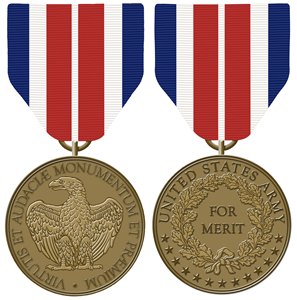
The Certificate of Merit Medal was a military decoration of the United States Army that was issued between the years of 1905 and 1918. The Certificate of Merit Medal replaced the much older Certificate of Merit which was authorized by the United States Congress on March 3, 1847.

The Congressional Gold Medal is an award bestowed by the United States Congress. It is Congress's highest expression of national appreciation for distinguished achievements and contributions by individuals or institutions. The congressional practice of issuing gold medals to occasionally honor recipients from the military began during the American Revolution. Later the practice extended to individuals in all walks of life and in the late 20th century also to groups. The Congressional Gold Medal and the Presidential Medal of Freedom are the highest civilian awards in the United States. The congressional medal seeks to honor those, individually or as a group, "who have performed an achievement that has an impact on American history and culture that is likely to be recognized as a major achievement in the recipient's field long after the achievement." However, "There are no permanent statutory provisions specifically relating to the creation of Congressional Gold Medals. When a Congressional Gold Medal has been deemed appropriate, Congress has, by legislative action, provided for the creation of a medal on an ad hoc basis." Thus, there are generally fewer gold medals than presidential medals. U.S. citizenship is not a requirement.

An order is a visible honour awarded by a sovereign state, monarch, dynastic house or organisation to a person, typically in recognition of individual merit, that often comes with distinctive insignia such as collars, medals, badges, and sashes worn by recipients.

The National Medal of Technology and Innovation is an honor granted by the President of the United States to American inventors and innovators who have made significant contributions to the development of new and important technology. The award may be granted to a specific person, to a group of people or to an entire organization or corporation. It is the highest honor the United States can confer to a US citizen for achievements related to technological progress.

The awards and decorations of Civil Air Patrol are "designed to recognize heroism, service, and program achievements" of members of Civil Air Patrol (CAP) of the United States of America. The CAP is the official auxiliary of the United States Air Force. These awards are made to improve the esprit de corps of members. These awards are all worn in the form of medals or ribbons and all are considered civilian decorations. Civil Air Patrol regulations allow them to only be worn and displayed on appropriate CAP uniforms. In order to be considered for one of these awards, an individual must be a member in good standing of Civil Air Patrol at the time of the act being recognized. There is a statute of limitations for these awards and all recommendations must be submitted within 2 years of the act being performed. It is possible for the next of kin of deceased persons to be presented awards to which a member was entitled, but which he or she did not receive. Award review boards are established at the region, wing, group, and squadron levels to consider recommendations for all awards and decorations.
Awards and decorations of the United States Army are those military awards including decorations which are issued to members of the United States Army under the authority of the Secretary of the Army. Together with military badges such awards provide an outward display of a service member's accomplishments.
Awards and decorations of the United States government are civilian awards of the U.S. federal government which are typically issued for sustained meritorious service, in a civilian capacity, while serving in the U.S. federal government. Certain U.S. government awards may also be issued to military personnel of the United States Armed Forces and be worn in conjunction with awards and decorations of the United States military. In order of precedence, those U.S. non-military awards and decorations authorized for wear are worn after U.S. military personal decorations and unit awards and before U.S. military campaign and service awards.
The United States Department of State, like other agencies of the U.S. federal government, gives civilian decorations for outstanding service, sacrifice, or heroism. The criteria for the awards are set down in 3 FAM 4820 - Foreign Affairs Manual, 3 FAM - Personnel, section 3 FAM 4800 Department Awards Program.
The Thanks of Congress is a series of formal resolutions passed by the United States Congress originally to extend the government's formal thanks for significant victories or impressive actions by American military commanders and their troops. Although it began during the American Revolutionary War, the practice peaked during the American Civil War. Similarly, the Confederate Congress also passed resolutions honoring extraordinary performance to individuals or military units.
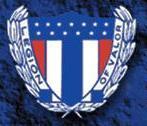
The Legion of Valor is a federally chartered corporation created to promote patriotic allegiance to the United States, fidelity to the U.S. Constitution, and popular support for civil liberties and the permanence of free institutions. Its membership is open to recipients of the Medal of Honor, the Distinguished Service Cross, the Navy Cross and the Air Force Cross.
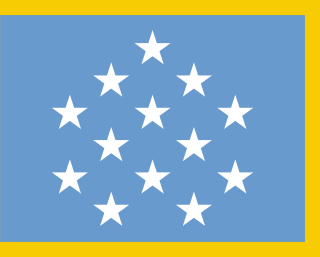
The Medal of Honor (MOH) is the United States Armed Forces highest and most prestigious military decoration that may be awarded to recognize American soldiers, sailors, marines, airmen, guardians, and coast guardsmen who have distinguished themselves by acts of valor. The medal is normally awarded by the president of the United States, but as it is presented "in the name of the United States Congress", it is sometimes erroneously referred to as the "Congressional Medal of Honor".

The "Borinqueneers Congressional Gold Medal" is a Congressional Gold Medal awarded to Puerto Rico's 65th Infantry Regiment by President Barack Obama, at an official ceremony on June 10, 2014. On May 19, 2014, the United States House of Representatives passed the Bill, known as HR 1726 and three days later on May 22, 2014, the Senate approved Bill S. 1174. With the approval of both houses, the president signed the legislation which awarded the Congressional Gold Medal to the 65th Infantry, the first segregated Hispanic military unit, and the first unit of the Korean War, to receive such distinction.
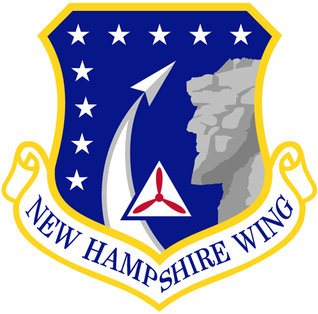
The New Hampshire Wing of the Civil Air Patrol (NHWG) is the highest echelon of the Civil Air Patrol (CAP) in New Hampshire, in the United States. Its headquarters is located in Concord, New Hampshire, near the Concord Municipal Airport. The New Hampshire Wing is part of the Northeast Region of CAP.
The Nisei Soldiers of World War II Congressional Gold Medal is an award made for the Japanese American World War II veterans of the 100th Infantry Battalion, the 442nd Regimental Combat Team and the Military Intelligence Service. The Congressional Gold Medal is the most prestigious award given to civilians in the United States for achievements and contributions. The medal was approved by Congress under Public Law 111–254 in 2010 to honor the Japanese Americans who had served in the war. It was collectively presented on November 2, 2011.










